Discover how different cultures promote longevity through balanced, nutrient-rich diets. You’ll find the Mediterranean diet emphasizing fruits, vegetables, and healthy fats; the Okinawa diet focusing on plants, fish, and mindful eating rituals; Blue Zones highlighting plant-based foods combined with social connections; Nordic practices favoring whole grains, root vegetables, and sustainable fish; and Sardinian traditions based on pastoral grains and fresh produce. Exploring these patterns reveals how food, community, and routines work together to support long, healthy lives for many around the world.
Key Takeaways
- Mediterranean, Okinawa, Blue Zones, and Nordic diets all emphasize plant-based foods, healthy fats, and whole grains for longevity.
- Cultural rituals and social eating practices promote moderation, mindful consumption, and long-term healthy habits.
- Regular intake of fish and root vegetables provides essential nutrients like omega-3s and antioxidants supporting health.
- Sustainable food sourcing, seasonal eating, and traditional preparation methods enhance nutritional value and environmental impact.
- Lifestyle factors such as physical activity, community bonds, and routines are integral to the longevity-promoting diets worldwide.
The Mediterranean Diet: A Celebration of Fruits, Vegetables, and Healthy Fats
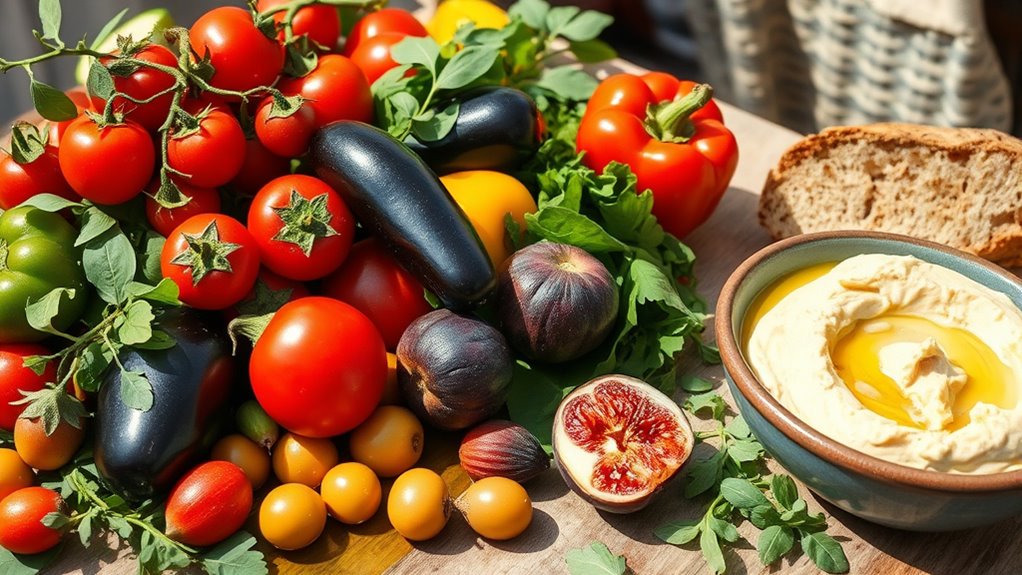
The Mediterranean diet stands out as a proven approach to promoting longevity by emphasizing the consumption of fruits, vegetables, and healthy fats. You’ll enjoy dishes seasoned with Mediterranean spices like oregano, basil, and cumin, which add flavor and antioxidant properties. Central to this diet is olive oil, known for its numerous benefits, including reducing inflammation and supporting heart health. When you cook with olive oil, you take advantage of its monounsaturated fats, which help lower bad cholesterol. This diet encourages fresh, whole foods that provide essential nutrients and antioxidants, boosting your overall well-being. By incorporating these spices and embracing olive oil benefits, you create flavorful, healthful meals that can help you live a longer, healthier life. Additionally, best dog training guides can offer valuable tips for maintaining a healthy lifestyle for your pets, contributing to their longevity and happiness. Including nutrient-dense foods in your meals ensures you receive vital vitamins and minerals necessary for optimal health. Engaging in mindful eating practices and understanding the cultural significance of traditional diets can further enhance your nutritional choices. Incorporating elements like pool & backyard upgrades, such as outdoor living spaces and water features, can also promote relaxation and overall well-being, complementing your health-focused lifestyle.
The Japanese Okinawa Diet: Emphasizing Vegetables, Tofu, and Fish
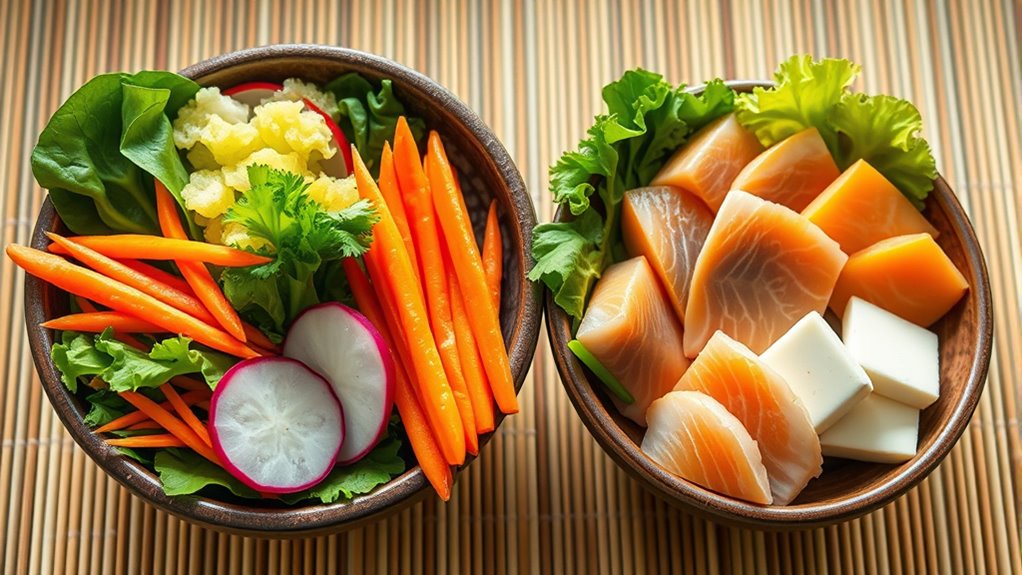
The Okinawa diet centers on plant-based foods, making vegetables a staple in your meals. Fish provides a healthy protein source without relying on red meat, supporting your longevity. Tofu adds variety and plant protein, reinforcing the diet’s focus on wholesome, nutrient-dense choices. Incorporating self-watering plant pots solutions can also help create a calm and organized kitchen environment that encourages healthier eating habits.
Plant-Based Focus
Have you ever wondered how Okinawa residents enjoy such remarkable longevity? Their diet emphasizes plant-based foods, making plant proteins a key component. You’ll find a rich vegetable diversity on their plates, including leafy greens, root vegetables, and sea vegetables, all packed with nutrients. This variety guarantees you get a broad spectrum of vitamins, minerals, and antioxidants that support health and vitality. By prioritizing plant foods, Okinawans reduce intake of processed and red meats, which are linked to many chronic diseases. Their focus on vegetables, tofu, and legumes creates a sustainable, nutrient-dense diet that promotes longevity. Incorporating similar plant-based focus into your meals can help boost your health and extend your years, just like in Okinawa. Additionally, adopting a plant-based diet can contribute to reducing the risk of lifestyle-related illnesses and improve overall well-being. Emphasizing nutrient-dense foods can further enhance your health outcomes and support a longer, healthier life. Incorporating traditional dietary patterns from various cultures can provide additional insights into sustainable, health-promoting eating habits.
Furthermore, focusing on renewable energy in food production and preservation methods can reduce environmental impact and support sustainable living practices.
Seafood as Protein
Ever wonder how Okinawans maintain their remarkable longevity? They rely on seafood as a primary protein source, emphasizing sustainable fishing practices to protect marine ecosystems. Fish like mackerel, sardines, and bonito provide essential omega-3s, which support heart and brain health. Consuming fish regularly helps reduce inflammation and lowers the risk of chronic diseases. The Okinawa diet encourages mindful fish consumption, balancing intake with other plant-based foods. By choosing sustainable fishing practices, you guarantee healthy oceans for future generations while enjoying the benefits of omega-3 fatty acids. Incorporating seafood into your diet like the Okinawans do can boost longevity and overall well-being, making it a crucial component of a balanced, healthful lifestyle.
The Blue Zones Diet: Secrets From the World’s Longest-Lived Communities
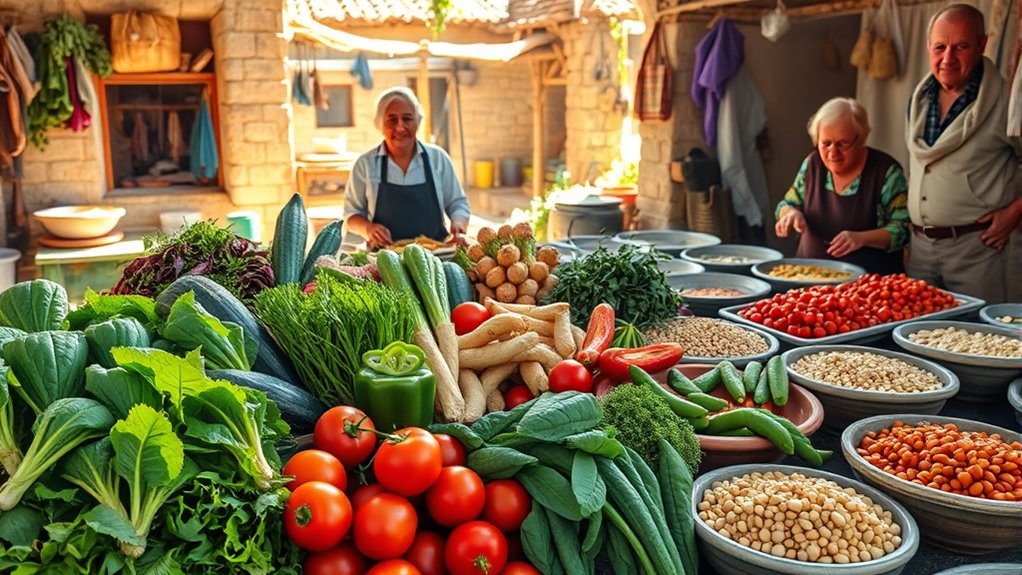
What makes certain communities boast some of the longest lifespans on Earth? It’s their shared lifestyle and dietary habits, like the Blue Zones communities. They eat mostly plant-based foods, practice regular physical activity, and incorporate habits like intermittent fasting. Herbal teas are common, supporting digestion and hydration. These communities focus on social connections and purpose, which boost longevity. Their diets emphasize nutrient-rich, whole foods, and small portions. The secret lies in their consistent routines and simplicity. Additionally, their cultural traditions often reinforce healthy eating and lifestyle choices, contributing further to their remarkable longevity. Understanding the impact of diet patterns and how spiritual energy influences overall health can provide deeper insights into sustaining vitality throughout life. Here’s a deeper look:
| Habit | Focus | Benefit |
|---|---|---|
| Plant-based | Fruits, vegetables, legumes | Heart health, longevity |
| Intermittent fasting | Eating within a window | Cellular repair, weight control |
| Herbal teas | Green, herbal, chamomile | Hydration, stress reduction |
| Social bonds | Community and purpose | Mental well-being |
The Nordic Diet: Incorporating Whole Grains, Root Vegetables, and Fish

The Nordic diet emphasizes the power of whole grains, root vegetables, and fish to promote health and longevity. By choosing these nutrient-rich foods, you can support your body’s natural resilience. Incorporating these ingredients into your meals can make a meaningful difference in your overall well-being.
Nordic Whole Grains
In the Nordic diet, whole grains serve as a cornerstone for both nutrition and flavor. Emphasizing grain diversity, it includes oats, rye, barley, and spelt, which provide essential nutrients and variety. These grains are rich in dietary fiber, promoting digestion and heart health. Incorporating a range of whole grains can help you meet your fiber needs and keep you full longer. Moreover, choosing organic options can enhance the health benefits and support sustainable farming practices natural techniques. Utilizing professional equipment for preparation can ensure the best quality and flavor in your dishes. Including a variety of grains may also contribute to a nutritional advantage that supports overall health and well-being.
Fish and Root Vegetables
Including fish and root vegetables in your diet enhances both flavor and nutrition, especially within the Nordic eating pattern. Fish consumption is central here, providing omega-3 fatty acids that support heart health. Root vegetable cultivation is widespread, offering nutrient-dense options like carrots, turnips, and parsnips. These ingredients are versatile and hearty, perfect for cold climates. Incorporating them regularly boosts your intake of vitamins and minerals while adding natural sweetness and earthiness to meals. Embracing this combination promotes longevity and helps prevent chronic diseases. Here’s a quick comparison:
| Fish Consumption | Root Vegetable Cultivation |
|---|---|
| Rich in omega-3 fatty acids | Widely grown for nutrition |
| Supports heart health | Adds natural sweetness |
| Traditionally part of diet | Essential in Nordic cuisine |
| Includes salmon, herring | Includes carrots, turnips |
| Promotes longevity | Enhances flavor and texture |
The Mediterranean-Asian Hybrid: Combining Eastern and Western Nutritional Wisdom
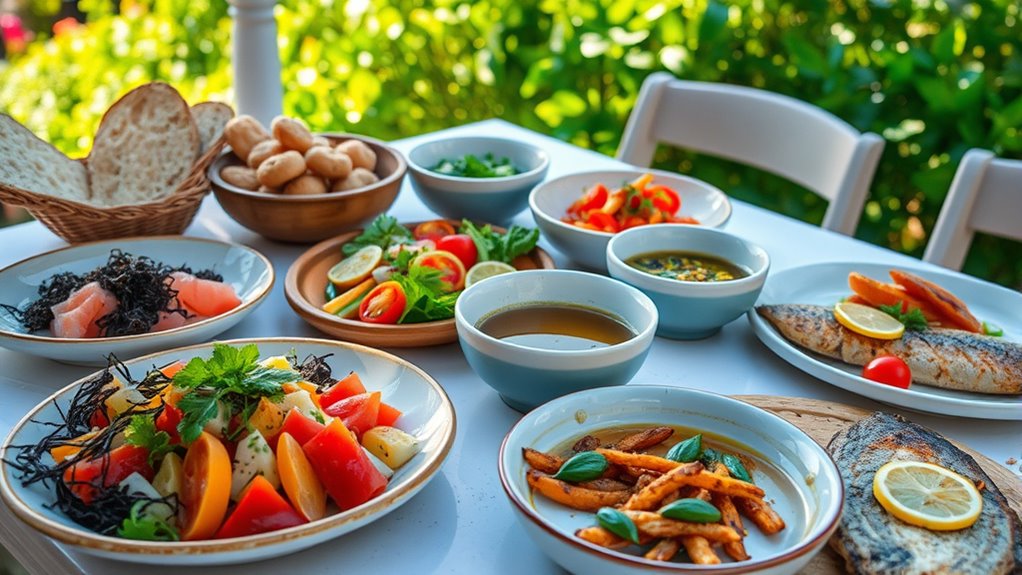
Blending Eastern and Western nutritional principles creates a powerful approach to longevity that leverages the strengths of both traditions. This fusion cuisine emphasizes nutritional integration, combining heart-healthy fats, fresh vegetables, and whole grains with flavorful spices and fermented foods. To maximize benefits, focus on:
Combining Eastern and Western diets boosts longevity through nutrient-rich, flavorful, and gut-friendly foods.
- Incorporating olive oil and fish rich in omega-3s, common in Mediterranean diets
- Adding fermented foods like kimchi or miso for gut health
- Including a variety of colorful vegetables and fruits for antioxidants
- Balancing grains and legumes to sustain energy and promote longevity
- Emphasizing sustainable farming practices to ensure the quality and environmental impact of your diet. Implementing soil health strategies can further enhance the nutrient density of your food. Recognizing the importance of seed allergy awareness can help prevent adverse reactions when diversifying your diet.
This hybrid approach encourages diverse, nutrient-dense meals that support immune function and reduce inflammation. Additionally, paying attention to food sourcing helps ensure the purity and nutritional integrity of your diet. By merging the best of Eastern and Western wisdom, you create a sustainable, flavorful diet that enhances health and longevity.
The Sardinian Diet: Pastoral Traditions and Grain-Based Foods
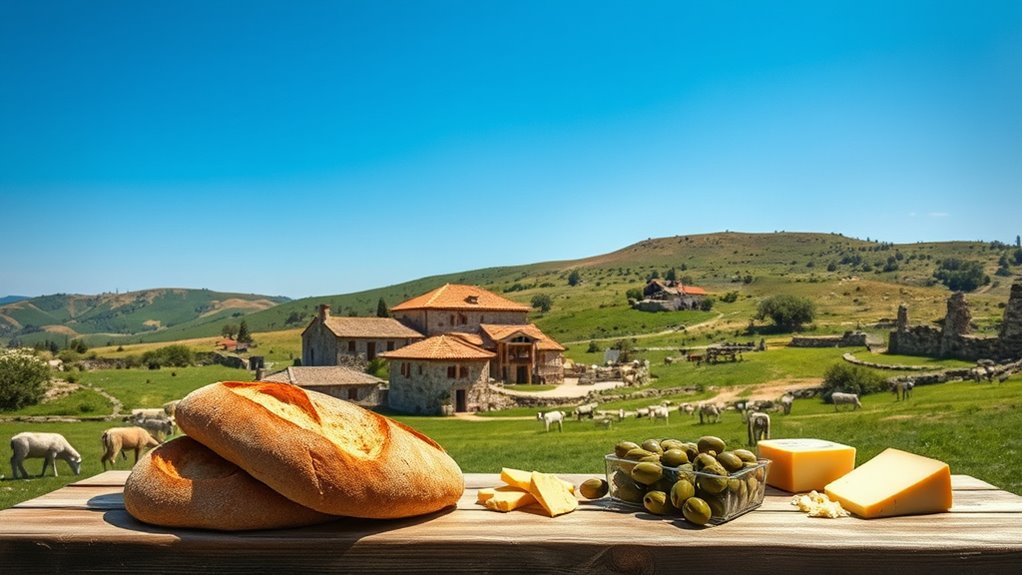
Building on the idea of nutrient-dense, balanced diets, the Sardinian diet emphasizes pastoral traditions and grain-based foods that have supported longevity for generations. You’ll find that their diet is rooted in locally produced grains like wheat and barley, served in simple, wholesome forms. These grain-based foods, combined with dairy from pastoral herds, create a nutrient-rich foundation. Sardinians often enjoy bread, pasta, and polenta, emphasizing moderation and seasonality. Their pastoral traditions foster a close connection to the land and sustainable food practices, which are key to their long-term health. The table below highlights key elements of their diet:
| Food Type | Traditional Preparation | Cultural Significance |
|---|---|---|
| Whole wheat bread | Baked with olive oil | Daily staple, symbol of sharing |
| Barley porridge | Cooked with milk | Breakfast, sustains longevity |
| Pasta | Handmade, with vegetables | Celebrations and family meals |
| Dairy | Sheep and goat milk | Essential protein source |
| Polenta | Boiled with herbs | Comfort food, social dish |
Additionally, their seasonal eating habits ensure that they consume foods at their peak nutritional value, further supporting health and longevity.
The Ikaria Diet: A Mediterranean Island’s Approach to Healthy Aging
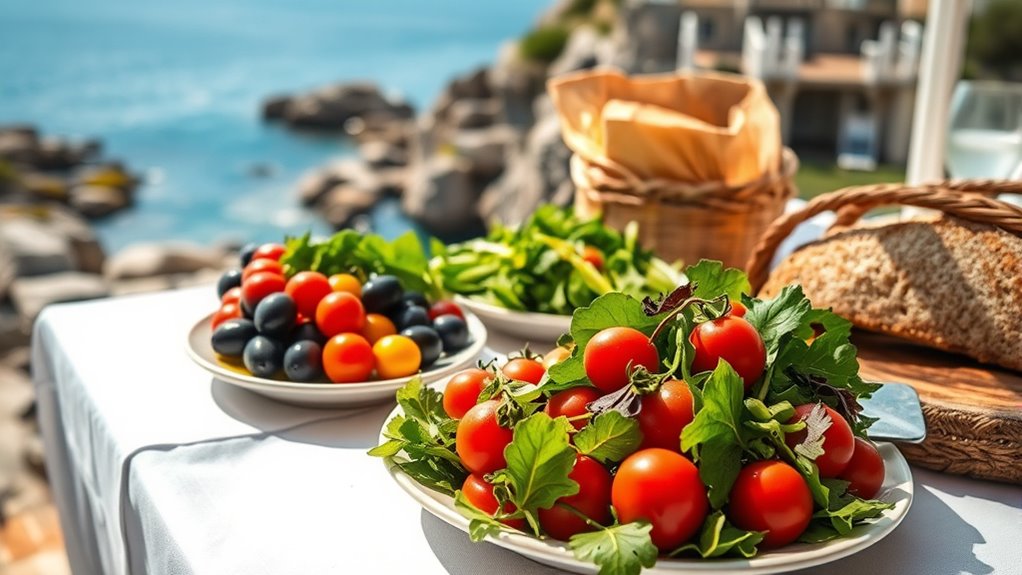
The Ikaria diet exemplifies a Mediterranean approach to healthy aging, emphasizing whole, minimally processed foods and active living. You’ll notice that cultural rituals and dietary traditions play a crucial role in maintaining longevity on this island. These practices foster social connections and reinforce healthy habits. To understand its core, consider:
- Emphasizing plant-based foods like vegetables, legumes, and whole grains
- Incorporating moderate wine consumption during meals
- Engaging in daily physical activity rooted in traditional routines
- Maintaining strong social bonds through communal meals and rituals
This cultural emphasis on shared meals and time-honored dietary traditions helps sustain health and vitality well into old age, making the Ikaria diet a model for healthy aging rooted in community and tradition.
The Seventh-Day Adventist Diet: Plant-Based Eating for Longevity
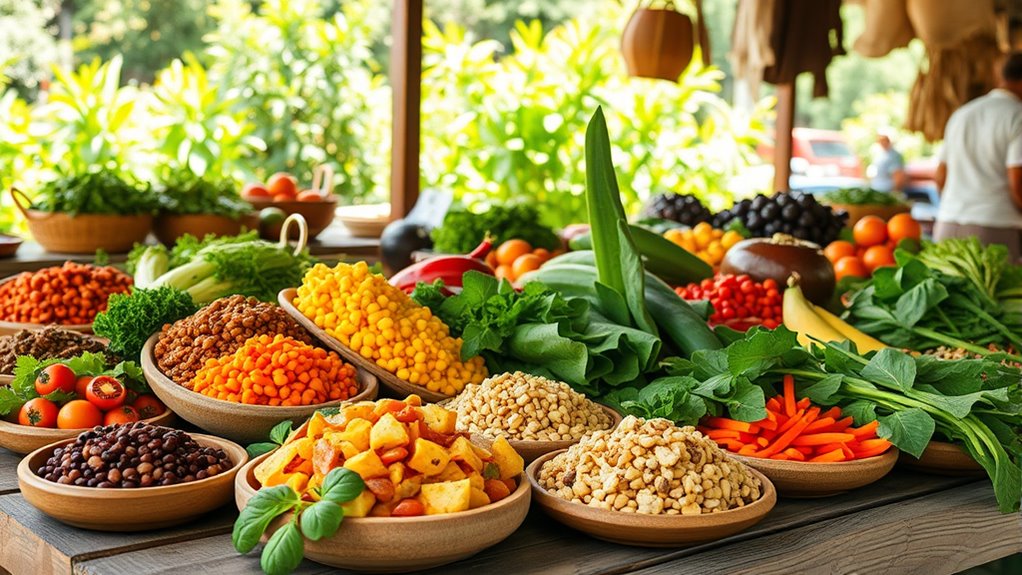
Have you ever wondered how a simple plant-based diet can promote longevity? The Seventh-Day Adventist diet emphasizes eating mostly fruits, vegetables, grains, nuts, and legumes, which are rich in nutrients and antioxidants. These plant-based benefits help reduce inflammation, lower cholesterol, and support heart health. Many adherents also follow specific dietary restrictions, avoiding alcohol, caffeine, and processed foods, which can contribute to healthier aging. By focusing on natural, minimally processed foods, this diet minimizes intake of harmful fats and additives, promoting better overall health. The discipline around dietary restrictions encourages mindful eating and portion control, further supporting longevity. Overall, the Seventh-Day Adventist approach showcases how a plant-based lifestyle can lead to a longer, healthier life.
The Traditional Okinawa and Sardinian Practices: Cultural Rituals and Dietary Choices
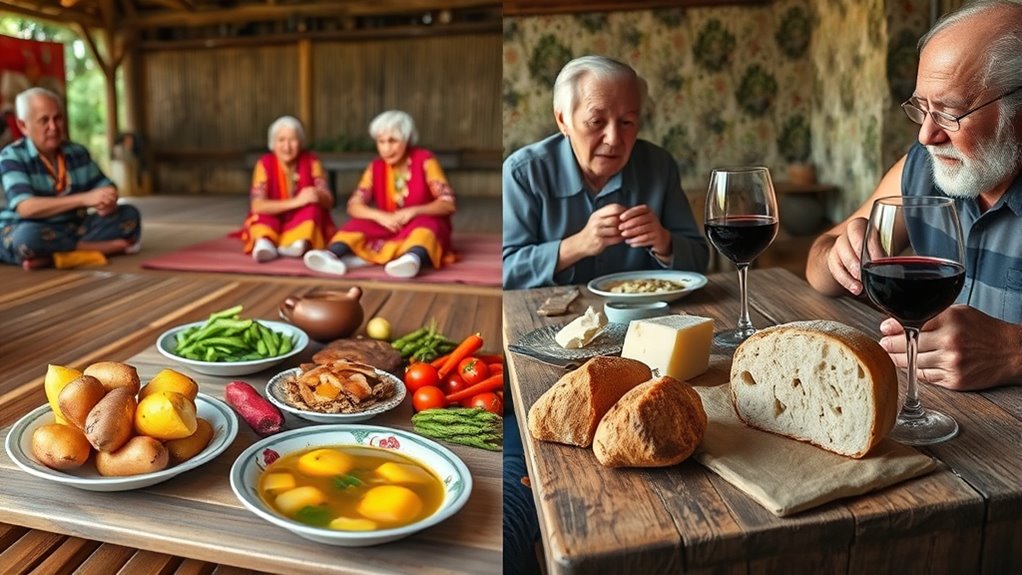
Cultural rituals and dietary choices in Okinawa and Sardinia play a essential role in promoting longevity, blending tradition with nutrition. These communities embrace traditional practices that emphasize moderation, plant-based foods, and social eating. Their cultural rituals reinforce healthy habits, creating a supportive environment for long life. Here are four key aspects:
- Regular consumption of vegetables, legumes, and whole grains
- Incorporation of traditional herbs and local ingredients
- Emphasis on social meals that foster community bonds
- Rituals that promote mindful eating and portion control
Frequently Asked Questions
How Do Cultural Rituals Influence Dietary Habits in Longevity Diets?
Cultural rituals substantially shape your dietary habits by guiding what, when, and how you eat. These traditions encourage specific foods and meal practices that promote health and longevity. You might find yourself following rituals like communal feasts or fasting, which reinforce healthy eating patterns. By embracing these cultural rituals, you can naturally adopt dietary habits that support a longer, healthier life, rooted in the rich traditions of your community.
What Role Does Physical Activity Play Alongside These Diets?
You play a vital role in longevity through exercise integration and maintaining activity frequency. Regular physical activity boosts your overall health, supports healthy aging, and complements your diet. By staying active daily, you enhance the benefits of nutritious foods, reduce disease risk, and improve your quality of life. Prioritize consistent movement, whether walking, gardening, or other activities, to maximize your longevity potential and stay vibrant longer.
Are There Common Social Factors Contributing to Longevity Across These Diets?
You’ll find that common social factors like community support and traditional practices greatly contribute to longevity. When you’re part of a close-knit community, you benefit from shared resources and emotional bonds that promote health. Embracing traditional practices often involves healthy eating, physical activity, and social engagement, which all reinforce a long, healthy life. These social connections and cultural norms help sustain positive habits across generations, enhancing overall longevity.
How Adaptable Are These Diets to Modern, Urban Lifestyles?
Did you know over 55% of the global population now lives in urban areas? Adapting longevity diets to modern lifestyles is quite feasible thanks to technological integration and urban adaptation. You can easily incorporate traditional healthy foods into your busy schedule with apps that track nutrition or delivery services that bring fresh, wholesome ingredients. While some adjustments are needed, these diets can seamlessly fit into your urban routine, promoting long-term health.
What Environmental Impacts Are Associated With These Traditional Diets?
You might wonder about the environmental impacts of traditional diets. These diets often rely on local, minimally processed foods, which reduce food transportation emissions. However, they can still contribute to issues like agricultural runoff from farming practices, affecting water quality. While generally more sustainable than modern diets, some traditional food production methods may also impact ecosystems. Overall, embracing local, seasonal foods helps minimize environmental footprints.
Conclusion
By exploring these diverse diets, you see that embracing plant-based foods, healthy fats, and whole grains can boost your longevity. Many long-lived communities share common habits like moderation and cultural traditions. While no single diet guarantees endless years, adopting these nutritious patterns can improve your health and happiness. So, try incorporating more vegetables, fish, and whole grains into your meals—you might just be on the path to a longer, healthier life.







